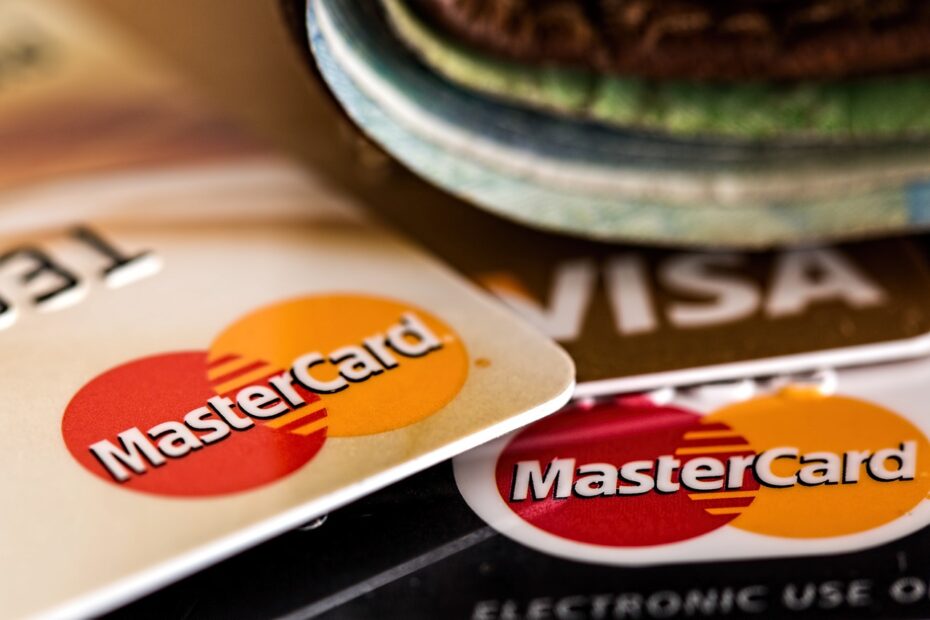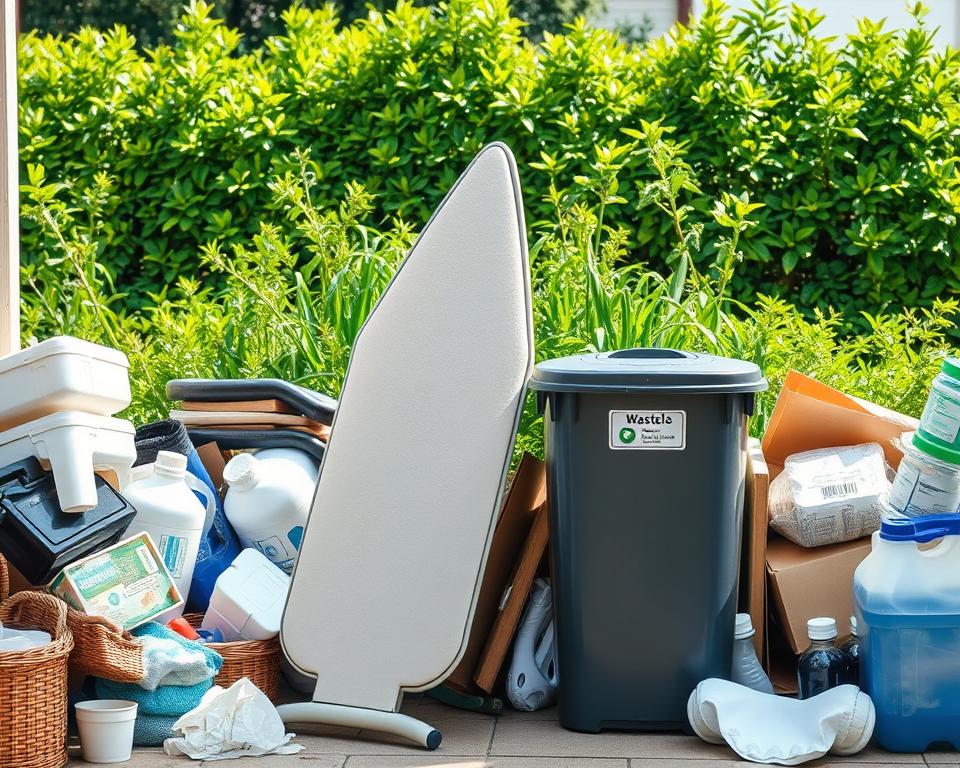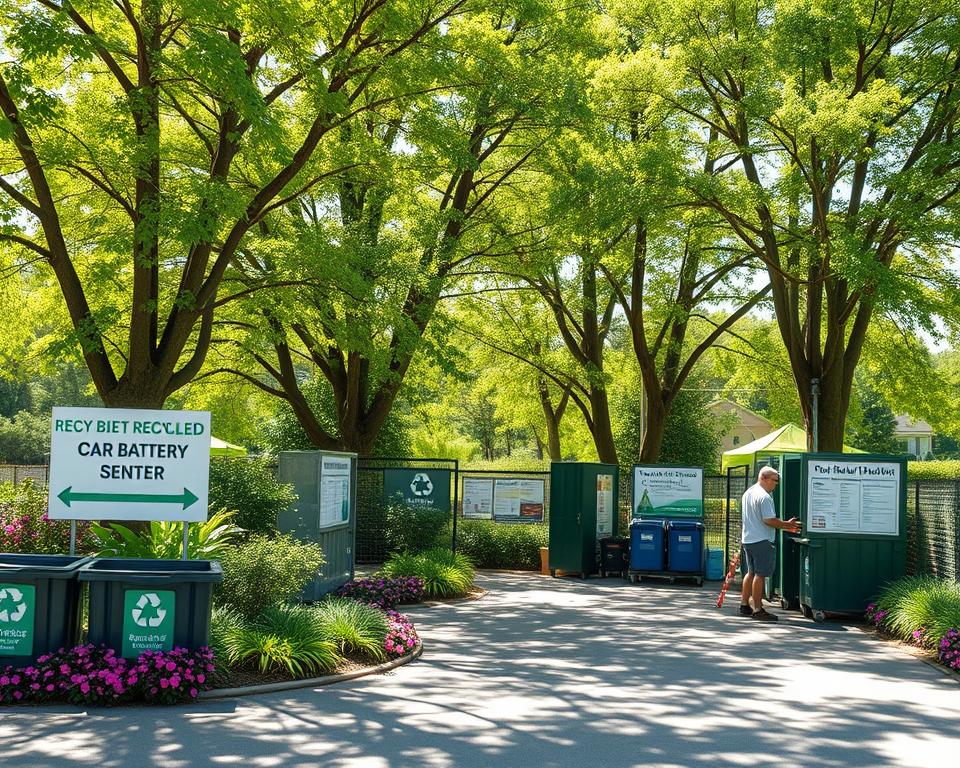A recent study found that over 15% of identity theft cases come from bad bank card disposal. It’s key to keep your financial info safe. So, learning how to properly get rid of old, expired, or cancelled cards is important. This article will show you the best ways to safely destroy and discard your old bank cards, keeping your data safe.
Key Takeaways
- Proper disposal of bank cards is vital to prevent identity theft and unauthorized use.
- Demagnetizing the card strip and smashing the chip are effective ways to securely destroy your card.
- Returning metal cards to the issuer or dropping them off at a bank branch ensures environmentally conscious disposal.
- Monitoring your credit reports and contacting card issuers can help you stay on top of your old account records.
- Downgrading or upgrading credit card accounts can be alternatives to closing them and potentially impacting your credit score.
Understanding the Importance of Proper Bank Card Disposal
Getting rid of your bank cards is key to keeping your money safe. If you don’t dispose of them right, you could face big problems like identity theft. Thieves can use your old cards to harm your credit score and steal your money.
Risks Associated with Improper Disposal
Not shredding or canceling your cards properly can let thieves get your info. They might use it to open fake accounts, buy things they shouldn’t, or even get loans in your name. This can really hurt your financial health.
Protecting Your Financial Information
To avoid these issues, you must destroy your old cards the right way. This means making sure they can’t be used again before you throw them away. It’s important to keep your financial info safe.
By following the right disposal steps, you can keep your personal and financial details safe. This helps prevent identity theft and fraud. Keeping your info secure is crucial when getting rid of old or canceled bank cards.
Steps to Deactivate and Destroy Your Bank Card
It’s important to get rid of your bank card the right way. This keeps your financial info safe and stops others from getting into your accounts. If your card is expired, lost, or not working right, you need to follow a few steps to keep your data safe.
Demagnetizing the Card Strip
The first thing to do is demagnetize the magnetic strip. Hold a strong magnet over the strip to wipe out the data. This makes the card useless for any future buys. It’s a simple way to stop anyone from using your card’s info.
Smashing the Chip
Next, you need to break the chip inside the card. Use a hammer or something heavy to smash it. This makes sure the card can’t be scanned or read. It adds an extra layer of protection for your financial info.
By taking these steps, you can deactivate and destroy your bank card safely. This means you can dispose of the bank card, shred credit card, cancel debit card, and destroy ATM card without worrying about identity theft or unauthorized access.
Dispose of the Bank Card
After deactivating your bank card, it’s time to get rid of it. Experts say to take a few easy steps. This ensures your personal and financial info is gone for good.
- Cut up the card into small pieces. Use scissors or a shredder to shred it into tiny bits.
- Put the shredded pieces in different trash bags or containers. This makes it hard for anyone to put it back together.
- Dispose of the bank card, shred credit card, cancel debit card, or destroy ATM card completely. This stops anyone from getting into your accounts.
By doing these steps, you can be sure your bank card is gone for good. Your sensitive information is safe from misuse.
Handling Expired or Cancelled Bank Cards
When your debit, credit, or ATM card expires or gets cancelled, it’s key to get rid of it right. Not shredding or destroying these cards can put you at risk for identity theft and fraud.
For plastic cards that have expired, you can just cut them up and toss them. But, if you have a metal card, call your bank. They’ll send you a special envelope to mail it back. Or, you can take it to a bank branch for safe disposal.
| Card Type | Disposal Method |
|---|---|
| Plastic Cards | Cut into small pieces and discard |
| Metal Cards |
|
By following these steps, you can keep your personal and financial info safe. Dispose of your bank card, shred your credit card, cancel your debit card, and destroy your ATM card properly.
Considerations for Metal Bank Cards
Getting rid of metal bank cards, like the Platinum Card from American Express or the Chase Sapphire Reserve, is different from plastic cards. These cards are made to last but are hard to dispose of because of their metal.
Mailing Back to the Issuer
The card issuer usually gives you a prepaid envelope to mail the metal card back to them. This is the best way to do it. It makes sure the card is destroyed safely and prevents any risks.
Dropping Off at a Bank Branch
You can also take the metal card to a local bank branch. The bank staff will make sure the Dispose of the bank card, shred credit card, cancel debit card, or destroy ATM card is handled right. This keeps you safe from identity theft or fraud.
Metal bank cards are hard to shred at home. Household shredders can’t handle them, and burning them can release harmful fumes. It’s safer to use the card issuer’s recommended ways to get rid of them.
The Collectors’ Market for Expired Cards
Did you know there’s a growing market for expired bank cards? The American Credit Card Collectors Society connects fans of rare and unique cards. Your expired bank card might not be worth much money. But, there’s a group of collectors who might see value in certain cards, especially if they’re in great shape or have special features.
Here are a few things to think about in the collectors’ market for expired cards:
- Certain expired cards, especially those with unique designs or historical significance, can interest collectors.
- The card’s condition is key, as collectors look for well-kept ones.
- Rare or limited-edition cards, like those for special events, might be more valuable.
- While most expired credit cards or debit cards aren’t worth much, there’s a community that values their history and uniqueness.
Before you dispose of the bank card, shred credit card, cancel debit card, or destroy ATM card, think about if it could be a collector’s item. The monetary value might be low, but for the right collector, it could be worth the effort.
Keeping Track of Old Credit Card Accounts
Even after you’ve thrown away your bank cards, it’s important to keep an eye on your old accounts. Check your credit reports from Experian, Equifax, and TransUnion often. This helps make sure your accounts are right and no one has opened new ones in your name.
If you find accounts you don’t remember, call the card companies. Ask about the account and close it if it’s not yours.
Accessing Your Credit Reports
Getting your credit reports is easy and helps you manage your old accounts. You can get a free report from each of the three big bureaus once a year. Looking at these reports can show you any wrong or new accounts.
This way, you can make sure your financial info is safe. It helps you dispose of the bank card, shred credit card, cancel debit card, and destroy ATM card details right.
Contacting Card Issuers
If you find accounts you don’t know about, call the card companies. They can tell you about the account and help you close it if it’s not yours. This is key to keeping your credit history right and your score good.
| Recommended Retention Period | Document Type |
|---|---|
| 60 days | Credit card statements (for billing disputes) |
| 1 year | Credit card statements (for expense tracking and tax purposes) |
| 3-7 years | Credit card statements (for tax-related records) |
| As long as the property is owned | Home purchase and improvement records |
| 3-6 years | Personal tax deduction records |
By being careful and managing your old accounts well, you keep your financial info safe. And your credit history stays accurate.
Closing Accounts: Impacts and Alternatives
Deciding to close a credit card account can be tough. It might seem like a quick fix to avoid fees. But, it can hurt your credit score. It’s important to know the effects and look for other ways to keep your credit healthy.
Downgrading to a No-Fee Card
Instead of closing, you could downgrade to a no-fee card. This keeps the account open and your credit history intact. By disposing of the bank card or shredding the credit card and asking for a downgrade, you avoid hurting your credit score.
Upgrading to an Unsecured Card
Another choice is to upgrade a secured card to an unsecured one. Secured cards help build credit. Upgrading can let you cancel the debit card or destroy the ATM card while keeping your credit score positive. This is good for those who have shown they can manage credit well.
Choosing to close a credit card should be a thoughtful decision. Look into options like downgrading or upgrading. This way, you can keep the good parts of your credit history while fixing any current issues or fees.
Conclusion
Safely getting rid of your bank cards is key to protecting your financial info and stopping identity theft. By following the right steps to deactivate, destroy, and throw away your old cards, you keep your personal and financial details safe.
Don’t forget to think about metal cards and watch your credit reports closely. Also, look into other ways to keep your credit score healthy instead of closing accounts. Whether you need to dispose of the bank card, shred credit card, cancel debit card, or destroy ATM card, these tips will guide you in managing your financial accounts well.
By carefully disposing of the bank card, you protect your personal info and keep your credit history strong. This gives you the financial freedom and security you need.
FAQ
How do I properly dispose of my bank card?
To safely get rid of your bank card, first deactivate it. Run a strong magnet along the card strip to demagnetize it. Then, use a hammer to smash the embedded chip.
Next, cut the card into small pieces. Put the fragments in multiple trash bags. This prevents the card from being reassembled.
What are the risks associated with improper disposal of bank cards?
Improper disposal of bank cards can lead to serious risks. These include identity theft and financial fraud. Criminals can access your personal and financial details from discarded cards.
This can cause lasting damage to your credit score and financial well-being.
How do I handle expired or cancelled bank cards?
For expired plastic cards, you can simply cut them up and throw them away. However, for metal credit cards, like the Platinum Card from American Express or the Chase Sapphire Reserve, you should return them to the issuer for secure destruction.
This can be done by mailing the card back in a prepaid envelope or dropping it off at a local bank branch.
Is there a collectors’ market for expired credit cards?
Yes, there is a growing collectors’ market for expired credit cards. The American Credit Card Collectors Society aims to connect enthusiasts who are interested in acquiring older, rare, or unique credit cards.
While your everyday expired bank card may not hold significant monetary value, there is a niche community of collectors. They may find value in certain expired cards, especially those in excellent condition or with special features.
How can I keep track of my old credit card accounts?
To keep track of your old credit card accounts, regularly review your credit reports from the three major bureaus (Experian, Equifax, and TransUnion). This ensures that all your accounts are accurately reflected and that no unauthorized accounts have been opened in your name.
If you come across any forgotten or unfamiliar accounts, contact the card issuers directly. Inquire about the status and potentially close the account if necessary.
What are the impacts and alternatives to closing a credit card account?
Closing a credit card account can have a negative impact on your credit score. It can affect your credit history length and credit utilization ratio. However, there are alternatives to consider before closing an account.
Consider downgrading to a no-fee card or upgrading to an unsecured card. By exploring these options with your card issuer, you can maintain the account’s positive impact on your credit while avoiding unnecessary fees or account closures.



